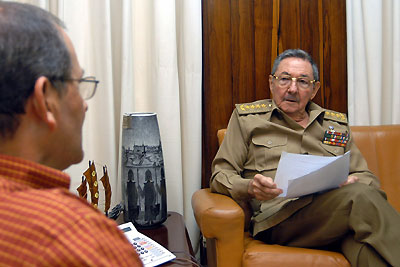Asia-Pacific
Raul Castro comments on Cuba-US ties
Updated: 2006-08-19 10:02
 |
Large Medium Small |
HAVANA - Acting President Raul Castro said Cuba remains open to normalized relations with the United States, but warned the Bush administration in his first comments since assuming power that it will get nowhere with threats or pressure.
 |
|
| Cuba's acting President Raul Castro (R) speaks to a journalist from Cuba's newspaper Granma in Havana in this August 2006 picture released on August 18, 2006. [Reutes] |
Raul Castro also said in Friday editions of the island's Communist Party newspaper that he had mobilized tens of thousands of troops in response to what he called aggressive U.S. acts, including stepped-up radio and television broadcasts to the island, and an $80 million plan to hasten the end of the Castros' rule.
"Some of the empire's war hawks thought that the moment had come to destroy the Revolution this past July 31," the day his brother Fidel Castro's illness was announced, Raul Castro said. "We could not rule out the risk of somebody going crazy, or even crazier, within the U.S. government."
State Department spokesman Tom Casey declined on Friday to respond specifically to Raul Castro's comment but said "I don't think we're particularly enamored of the first words we heard from 'Fidel Light.'"
For more than four decades, U.S. policy has been to undermine cuba's government through a trade embargo and restrictions on American travel to the Caribbean country. The neighboring countries have been without diplomatic relations since January 1961.
The 75-year-old Cuban defense minister said his 80-year-old brother is undergoing a "satisfactory and gradual recovery" from intestinal surgery. The interview in Friday's newspaper seemed aimed at answering questions at home and abroad about Raul Castro's whereabouts and activities after his brother granted him provisional power.
"They should be very clear that it is not possible to achieve anything in Cuba with impositions and threats," the younger Castro said of the U.S. "On the contrary, we have always been disposed to normalize relations on an equal plane.
"What we do not accept is the arrogant and interventionist policy frequently assumed by the current administration of that country," he added.
Raul Castro's comments essentially restated his brother's longstanding position of favoring normalized diplomatic and trade ties with the United States.
In Washington, U.S. State Department characterized the temporary leadership hand over as a "dynastic succession," saying it is not acceptable to the United States and would be rejected by the Cuban people over the long run.